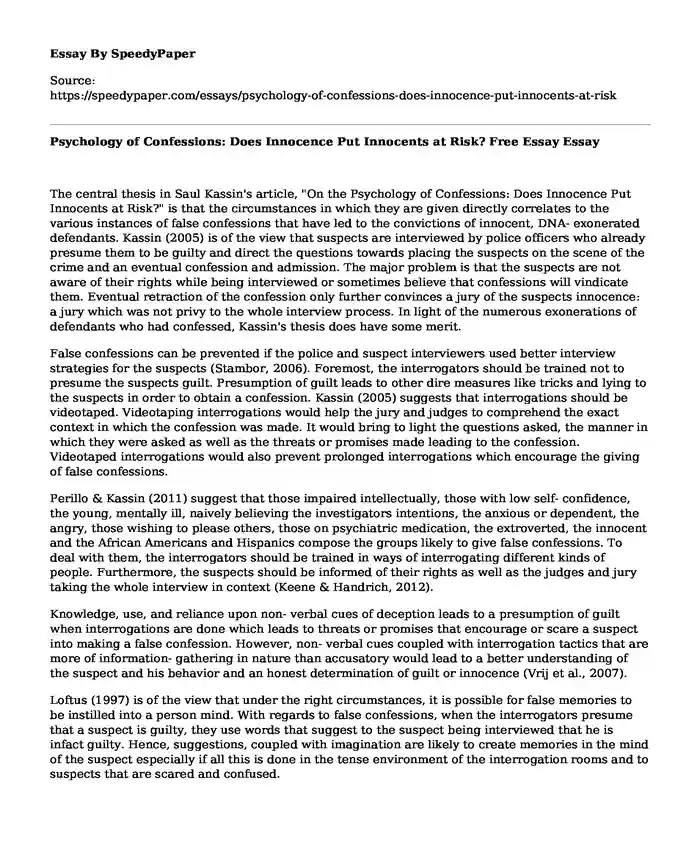
| Type of paper: | Essay |
| Categories: | Psychology |
| Pages: | 3 |
| Wordcount: | 654 words |
The central thesis in Saul Kassin's article, "On the Psychology of Confessions: Does Innocence Put Innocents at Risk?" is that the circumstances in which they are given directly correlates to the various instances of false confessions that have led to the convictions of innocent, DNA- exonerated defendants. Kassin (2005) is of the view that suspects are interviewed by police officers who already presume them to be guilty and direct the questions towards placing the suspects on the scene of the crime and an eventual confession and admission. The major problem is that the suspects are not aware of their rights while being interviewed or sometimes believe that confessions will vindicate them. Eventual retraction of the confession only further convinces a jury of the suspects innocence: a jury which was not privy to the whole interview process. In light of the numerous exonerations of defendants who had confessed, Kassin's thesis does have some merit.
False confessions can be prevented if the police and suspect interviewers used better interview strategies for the suspects (Stambor, 2006). Foremost, the interrogators should be trained not to presume the suspects guilt. Presumption of guilt leads to other dire measures like tricks and lying to the suspects in order to obtain a confession. Kassin (2005) suggests that interrogations should be videotaped. Videotaping interrogations would help the jury and judges to comprehend the exact context in which the confession was made. It would bring to light the questions asked, the manner in which they were asked as well as the threats or promises made leading to the confession. Videotaped interrogations would also prevent prolonged interrogations which encourage the giving of false confessions.
Perillo & Kassin (2011) suggest that those impaired intellectually, those with low self- confidence, the young, mentally ill, naively believing the investigators intentions, the anxious or dependent, the angry, those wishing to please others, those on psychiatric medication, the extroverted, the innocent and the African Americans and Hispanics compose the groups likely to give false confessions. To deal with them, the interrogators should be trained in ways of interrogating different kinds of people. Furthermore, the suspects should be informed of their rights as well as the judges and jury taking the whole interview in context (Keene & Handrich, 2012).
Knowledge, use, and reliance upon non- verbal cues of deception leads to a presumption of guilt when interrogations are done which leads to threats or promises that encourage or scare a suspect into making a false confession. However, non- verbal cues coupled with interrogation tactics that are more of information- gathering in nature than accusatory would lead to a better understanding of the suspect and his behavior and an honest determination of guilt or innocence (Vrij et al., 2007).
Loftus (1997) is of the view that under the right circumstances, it is possible for false memories to be instilled into a person mind. With regards to false confessions, when the interrogators presume that a suspect is guilty, they use words that suggest to the suspect being interviewed that he is infact guilty. Hence, suggestions, coupled with imagination are likely to create memories in the mind of the suspect especially if all this is done in the tense environment of the interrogation rooms and to suspects that are scared and confused.
References
Keene, D. L & Handrich R.R (2012). Only the Guilty Would Confess to Crimes: Understanding the Mystery of False Confessions. The American Society of Trial Consultants
Kassin, S.M. (2005) On the Psychology of Confessions: Does Innocence Put Innocents at Risk? American Psychologist Vol.60 No.3, 215 228
Loftus, E.F. (1997) Creating False Memories. Scientific American, Inc
Perillo, J.T., Kassin, S.M. (2011). Inside Interrogation: The Lie, the Bluff, and the False Confession. Law and Human Behavior Vol.35. 327 337
Stambor, Z. (2006). Can Psychology Prevent False Confessions? American Psycholoy Vol. 37 No. 8
Vrij, A., Mann, S., Kristen, S., Fisher, R.P. (2007). Cues to Deception and Ability to Detect Lies as a Function of Police Interview Styles. Law and Human Behavior. Vol.31, No.5, 499
Cite this page
Psychology of Confessions: Does Innocence Put Innocents at Risk? Free Essay. (2019, Sep 17). Retrieved from https://speedypaper.net/essays/psychology-of-confessions-does-innocence-put-innocents-at-risk
Request Removal
If you are the original author of this essay and no longer wish to have it published on the SpeedyPaper website, please click below to request its removal:
- Monetary Policy of Turkey - Finance Essay Sample
- Cheap Money - Free Essay on Money Development
- Independence and Reflective Critical Thinking Essay, Free Example
- Essay Example on a Psychological Aspect of a Cult
- Animal Liberation Essay Sample
- Article Analysis Essay on "Why is Privacy Important"
- How to Reduce Divorce Rates in the United States - Essay Sample
Popular categories




